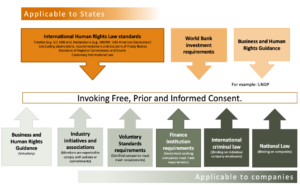Free, Prior and Informed Consent
The right to FPIC is a key principle of international human rights law to protect Indigenous Peoples’ livelihoods and territories and is therefore a requirement of many sustainability standards and international finance institutions. However, despite a growing body of knowledge around FPIC, there are limited resources designed specifically to help assurance providers verify whether FPIC has been achieved.
Since 2017, Equitable Origin and the Roundtable for Sustainable Biomaterials (RSB) have been working jointly on a project funded through the ISEAL Innovations Fund to research and develop a means of addressing this challenge. The key output from this project is draft framework for a tool that can be used to aid the verification process. The tool is multi-sided, facilitating a “co-audit” process that is jointly implemented by the assurance provider and by the affected Indigenous Peoples’ community.
First, standards organisations have attracted increased scrutiny from rights-based and advocacy organisations, such as Forest Peoples Programme, who have brought to light inadequacies of standard systems, assurance and certification processes specifically in relation to Indigenous Peoples rights and FPIC. Second, an FPIC process that is not conducted appropriately, and fully, nor adequately monitored on an ongoing basis, risks undermining trust and working relationships between the communities, companies and other stakeholders involved in project development and execution, or, worse still, risks failing to safeguard the rights of Indigenous Peoples to participate in, and consent to, development planning that affects them.

The risk is that the potential positive impact from standards’ application can be significantly diminished; an eventuality that FPIC-360° sets out to address.
Animated, Educational FPIC Video, in Spanish (with English subtitles)
Project Partners

FPIC-360° is an Equitable Origin initiative in partnership with the Roundtable on Sustainable Biomaterials (RSB) and the Coordinator of Indigenous Organizations of the Amazon River Basin (COICA). This project is co-financed by the ISEAL Innovations Fund, which is supported by the Swiss State Secretariat for Economic Affairs SECO.
